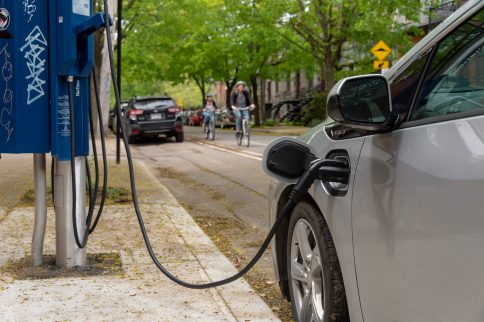by Lori Straus
The shift toward electric vehicles (EVs) has been picking up steam for over a decade now. If you’re in the market for a new car and you’re considering an EV, how do you know that the one you want to buy is more energy efficient overall compared to a fuel-efficient, gas-powered vehicle? In this blog post, we’ll quickly explain how fuel efficiency is measured in vehicles and then show you what value to look for if you’re trying to compare gas-powered vehicles with EVs.
Calculating Fuel Efficiency in Gas-Powered Vehicles
Fuel efficiency in vehicles with combustion engines are measured in L/100 km in Canada and in miles per gallon (MPG) in the U.S.
To calculate this number in Canada, vehicles must pass a 5-cycle test in a laboratory. The results of the test are summarized in an overall energy rating that reflects a vehicle’s average use of gas over the course of a year.
Note that vehicles made before model year 2015 follow a different rating system, and a few alterations were made to the calculations again beginning in model year 2017.
Calculating Fuel Efficiency in Electric Vehicles
By contrast, fuel consumption in EVs is measured in kilowatt hours, just like the electrical consumption of your home. One kWh is equivalent to running 10 100-watt light bulbs for one hour. EVs are overall more fuel efficient than their combustion motor counterparts.
However, very few people these days will buy a 100% electric vehicle, because the infrastructure to support long-distance driving still needs to be built. This means that most people driving an electric vehicle are actually driving a hybrid vehicle: one that uses gas and electricity.
Hybrid vehicles come with EnerGuide ratings for both types of fuel efficiency: litres per 100 kilometres for when the car uses gas and kilowatt hours for when the car drives on electricity.
What is MPGe?
Let’s return to our initial problem: How can you compare the energy efficiency of an EV (including hybrids) to that of a gas-powered vehicle? By using MPGes.
MPGe stands for miles per gallon equivalent. It is not an exact measure, but it helps consumers compare the fuel efficiency of hybrid and electric vehicles with gas-powered ones. The Canadian equivalent is Le/100 km.
In the U.S., the Environmental Protection Agency calculated that 1 gallon of gas contains the electrical equivalent of 33 kWh. Using this, they could offer a reasonable estimate of how much energy an electric vehicle needs compared to a combustion-engine vehicle. Natural Resources Canada says that the metric equivalent is 8.9 kWh to 1 L of gasoline.
When you’re shopping for hybrid vehicles, look for the EnerGuide label; it will give you fuel consumption ratings for both electric-only and gasoline-only modes. The electric-only mode rating is Le/100km, so you can compare both fuel consumption modes.
Buying Fuel-Efficient Vehicles
We all want to save money, and buying a vehicle that uses less fuel is one way to achieve that goal. By taking note of the EnerGuide ratings of the vehicles you’re considering for your next ride, you’ll be better able to compare apples and oranges if you’re considering a hybrid.


